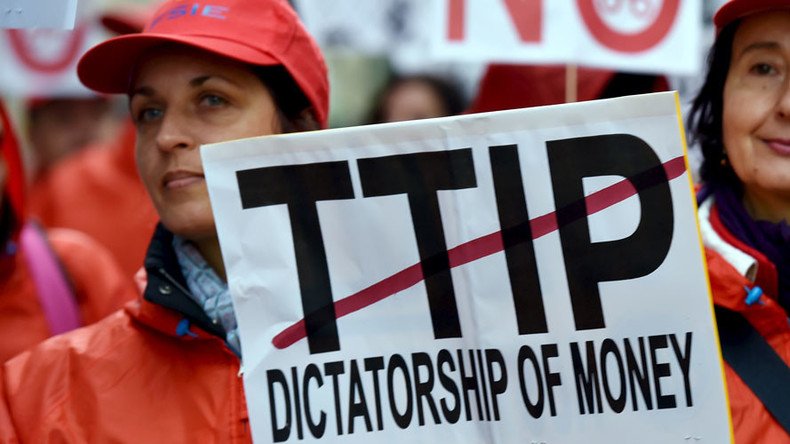Government capitulation on TTIP driven by unlikely Tory-Labour alliance

An unlikely alliance of Labour and Tory Euroskeptic MPs has forced the government to bow to demands to protect the National Health Service (NHS) from a controversial US-EU trade deal being brokered behind closed doors.
Tory rebels threatened to join forces with Labour and the Scottish National Party (SNP) to support an amendment to the Queen’s Speech highlighting the lack of legislation protecting Britain’s public health service from the Transatlantic Trade and Investment Partnership (TTIP) deal.
Labour leader Jeremy Corbyn had called on his MPs to back the amendment, which explicitly “regretted” the fact Downing Street had no intention of legislating to safeguard the NHS from the contentious trade agreement.
David Cameron caves in over TTIP to avoid Tory rebellion | https://t.co/K0IYdwoWp4 - https://t.co/LAnBeJJxet#bbcdppic.twitter.com/yMjQNbXGeV
— noel jon pleb (@nja5) May 20, 2016
Rattled by the prospect of a Tory rebellion, Downing Street blinked first and vowed to support the amendment just two weeks ahead of Britain’s EU referendum vote. More than 24 pro-Brexit Tory MPs vowed to back the amendment, as did the Green Party MP and the SNP.
A spokesman for Number 10 insisted the NHS had never been jeopardized by the EU-US trade deal.
“As we’ve said all along there is no threat to the NHS from TTIP. So if the amendment is selected we will accept it,” he said.
However, anti-TTIP campaigners reject this argument, insisting the draft trade agreement will pave the way for further privatization of Britain’s public health service.
There is no guarantee at present that Downing Street’s U-turn on the amendment will mean the government is compelled to take legal action to ensure the NHS is definitively exempt from TTIP.
If the government had rejected the amendment and it was a success, it would have marked the first defeat on the Queen’s Speech for any British government in nearly a century.
#TTIP has become such a toxic issue it could result in a historic defeat for the government
— Global Justice Now (@GlobalJusticeUK) May 19, 2016
https://t.co/4MnYhzGzlnpic.twitter.com/jCLXeesnki
Global Justice Now (GJN), which has campaigned vehemently against TTIP, branded Prime Minister David Cameron’s capitulation a quick but “embarrassing U-turn.”
“MPs have repeatedly tried to assure the general public that the NHS is entirely safe from TTIP, but experience from similar trade deals in other countries shows that public health services have been attacked,” GJN director Nick Dearden said.
“If the government is now admitting that the NHS does need protecting from TTIP after two years of strenuously denying it, it shows how little weight is carried by their other attempts to reassure the public over TTIP.”
Dearden suggested the amendment was bound up in a tightly-woven Brexit agenda for Euroskeptic politicians. However, he noted MPs from across Britain’s political spectrum are rejecting the government’s attempt to fast track the deal, which will likely erode labor rights, public services, environmental standards and consumer protections in Britain.
“Across Europe, senior political figures and national parliaments have started to take very visible steps backwards from TTIP in response to the controversy and unpopularity of the deal,” he said.
“Cameron is in a trickier position as he has vocally positioned himself as both an originator and a champion of the deal.”
Observers note that Tory Euroskeptics’ willingness to join forces with Labour, the SNP and the Greens on the issue will likely deepen existing divisions in the Conservative Party. The move will also anger Downing Street, which planned to use the Queen’s Speech to lay out plans detailing a fresh policy path for the aftermath of the EU referendum.












